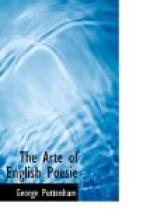Sometime the vndeceny ariseth by the indignitie of the word in respect of the speaker himselfe, as whan a daughter of Fraunce and next heyre generall to the crowne (if the law Salique had not barred her) being set in a great chaufe by some harde words giuen her by another prince of the bloud, said in her anger, thou durst not haue said thus much to me if God had giuen me a paire of, &c. and told all out, meaning if God had made her a man and not a woman she had bene king of Fraunce. The word became not the greatnesse of her person, and much lesse her sex, whose chiefe virtue shamefastnesse, which the Latines call Verecundia, that is a naturall feare to be noted with any impudicitie: so as when they heare or see any thing tending that way they commonly blush, & is a part greatly praised in all women.
Yet will ye see in many cases how pleasant speeches and fauouring some skurrillity and vnshamefastnes haue now and then a certaine decencie, and well become both the speaker to say, and the hearer to abide, but that is by reason of some other circumstance, as when the speaker himselfe is knowne to be a common iester or buffon, such as take vpon them to make princes merry, or when some occasion is giuen by the hearer to induce such a pleasaunt speach, and in many other cases whereof no generall rule can be giuen, but are best knowen by example: as when Sir Andrew Flamock king Henry the eights standerdbearer, a merry conceyted man and apt to skoffe, waiting one day at the kings heeles when he entred the parke at Greenewich, the king blew his horne, Flamock hauing his belly full, and his tayle at commaundment, gaue out a rappe nothing faintly, that the king turned him about and said how now sirra? Flamock not well knowing how to excuse his vnmannerly act, if it please you Sir quoth he, your Maiesty blew one blast for the keeper and I another for his man. The king laughed hartily and tooke it nothing offensiuely: for indeed as the case fell out it was not vndecently spoken by Sir Andrew Flamock, for it was the cleaneliest excuse he could make, and a merry implicatiue in termes nothing odious, and therefore a sporting satisfaction to the kings mind, in a matter which without some such merry answere could not haue bene well taken. So was Flamocks action most vncomely, but his speech excellently well becoming the occasion.
But at another time and in another like case, the
same skurrillitie of Flamock was more offensiue,
because it was more indecent. As when the king
hauing Flamock with him in his barge, passing
from Westminster to Greenewich to visite a fayre Lady
whom the king loued and was lodged in the tower of
the Parke: the king comming within sight of the
tower, and being disposed to be merry, said, Flamock
let vs rime: as well as I can said Flamock
if it please your grace. The king began thus:
Within this towre,
There lieth a flowre,
That hath my hart.




